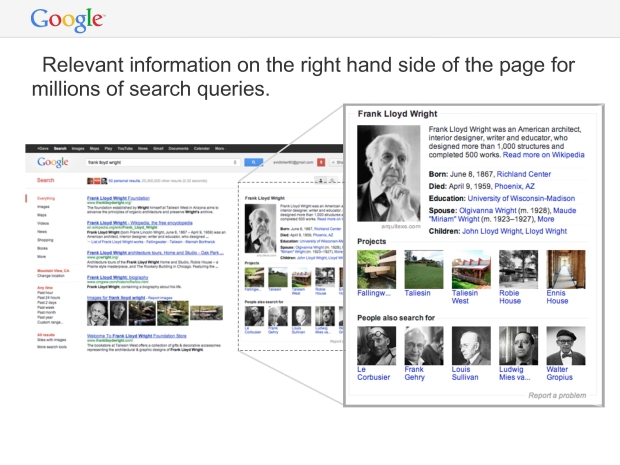Why Google and the web need the Knowledge Graph

Google's introduction of the Knowledge Graph is probably the most important thing the company has done in years.

Google has unveiled its Knowledge Graph, a step towards semantic search. Image credit: Google
I've not had the chance to play with it yet, but, if it works as described, the Knowledge Engine really is a step towards the next generation of search and of computing as a whole. You could even call it an artificial intelligence move: computers and the web cannot display intelligence without a genuine understanding of context and relationships.
The idea takes Google Search way beyond its main direct rival, Bing. However, Google's biggest opponent right now is Facebook. Facebook is trying to make itself the default point of entry to the web, and Google doesn't want to lose that status. There's too much advertising money at stake.
Although the Knowledge Graph has clearly been under development for a long time, the timing of the announcement — less than two days before Facebook's IPO — is unmistakeably competitive.
Calling it the Knowledge Graph is also a dead giveaway. Facebook's relational understanding is all based on human interactions, recorded and exploited through its Open Graph. Google+ was an attempt to play catch-up, but the Knowledge Graph exploits the enormous amount of data that is not necessarily user-related.
Essentially, this is Google playing to its core strengths, rather than playing by its rivals' rules.
Is privacy relevant?
The big question right now is how the Knowledge Graph relates to Google+ and the company's deeply contentious new privacy policy, which allows data-sharing across the myriad Google services.
Over on our US sister site, ZDNet.com, Christopher Dawson has suggested that the Knowledge Graph was the motive behind that privacy policy change. I'm not so sure about that.
I don't think the Knowledge Graph needs a unified privacy policy. That policy is essential if Google is to understand its users in the way it wants, but, at this early stage, the Knowledge Graph appears to be the counterpart to all that identity-driven stuff — a move that is based on aggregating what everyone is looking for, rather than what the specific user is looking for.
That's not to say the Knowledge Graph and Google's social graph (as they refrain from calling it) won't both feed into the results the user sees, but this latest move seems to be nothing more and nothing less than Google hewing to its original aim: organising the world's information.
The main point of Google+ and the privacy policy is to let Google better tailor their ads to the user, but that's little use if the user's not there. If Google provides a better service, its users will stay in its environment, and the ad-targeting can commence.
The Knowledge Graph is a major evolution for search, it's a step towards the semantic web, and it should make the web easier to use and more useful. Frankly, if you can't already tell from my tone, it's all rather exciting.